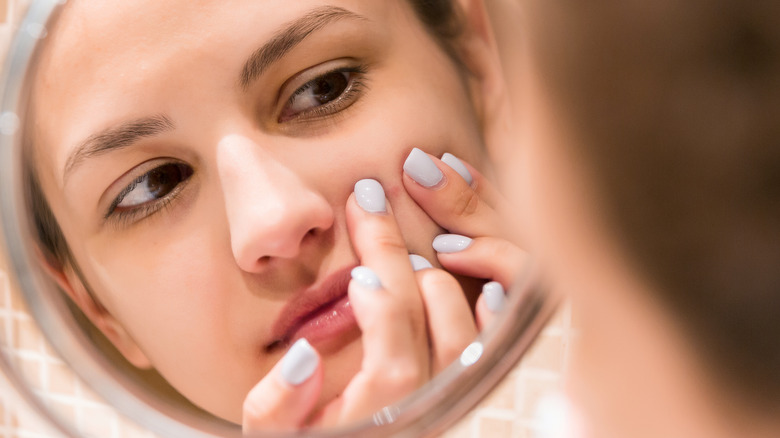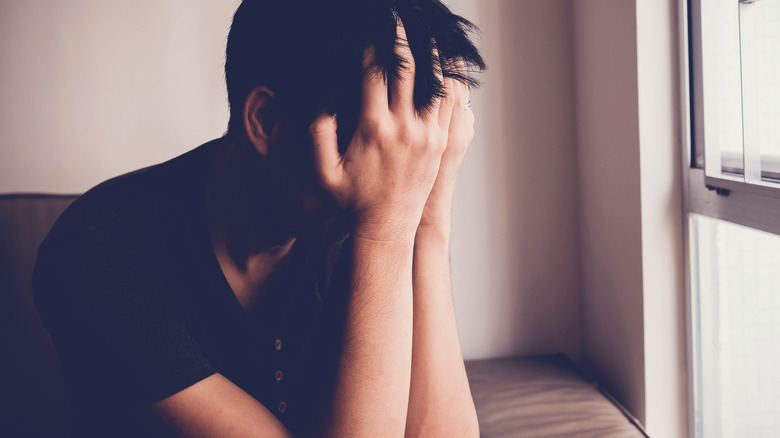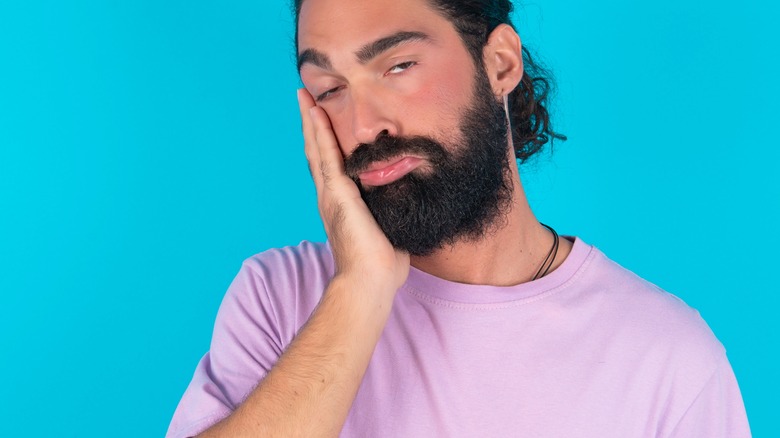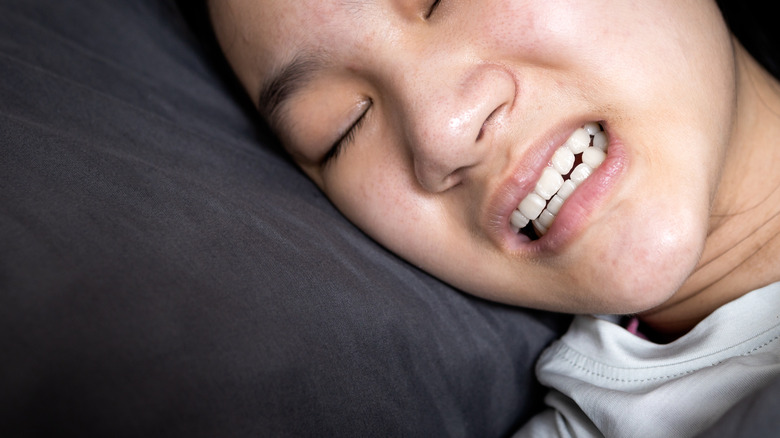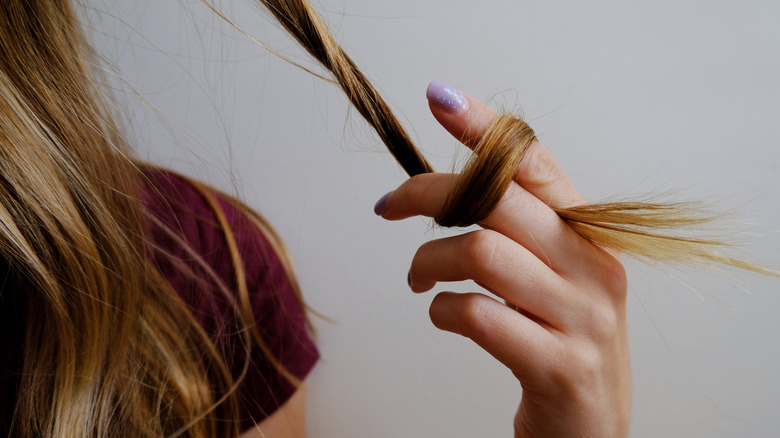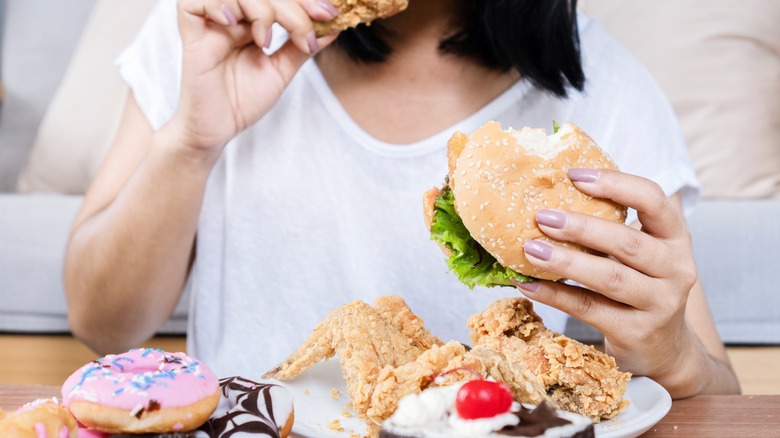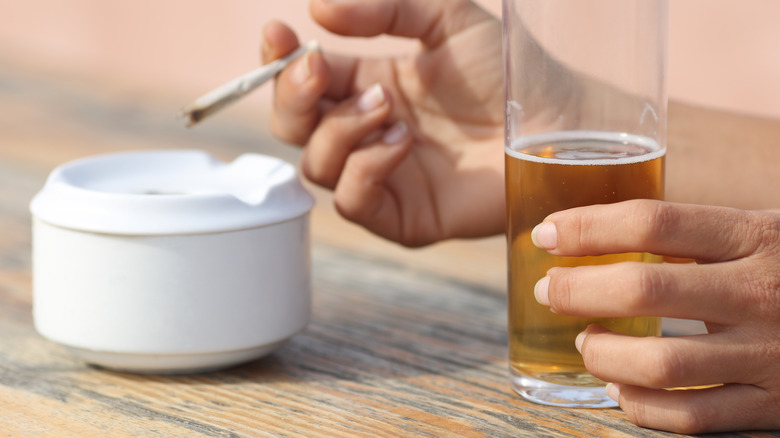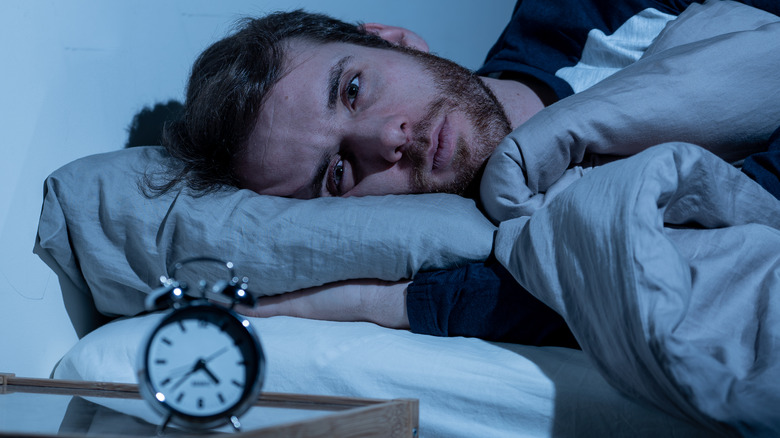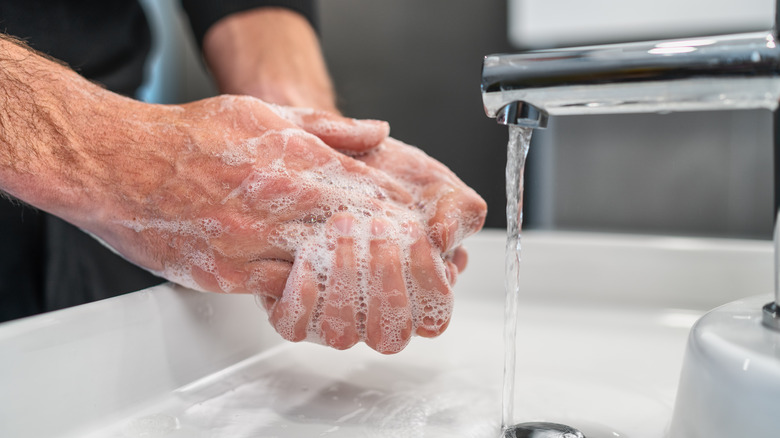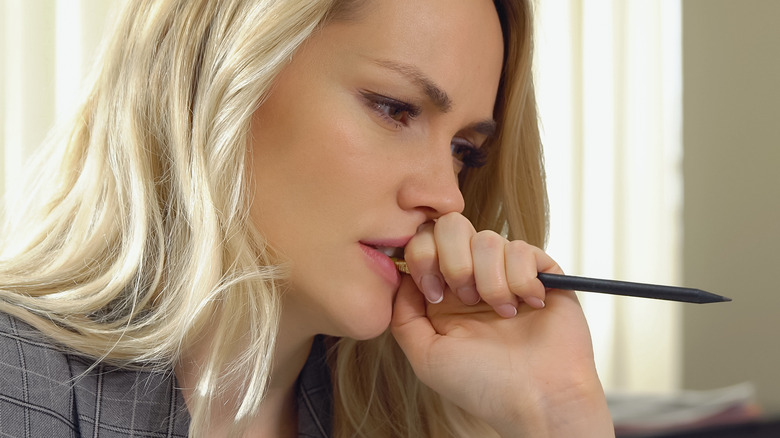Nervous Habits That Can Have A Harmful Effect On Your Body
Perhaps you've seen someone with a nervous habit, or maybe you have one yourself. Nervous habits are hard to control and sometimes automatic behaviors that don't really serve any purpose, but are repeated often (via Exploring Your Mind). These behaviors make you feel calm, relieved, comfortable, or in control when you're nervous, anxious, or restless. Because of this, you get the urge to repeat the behavior whenever you're in that emotional state. With time, the behavior can turn into an automatic habit that you find yourself doing, even when you're bored or distracted and have no particular emotional trigger.
Nervous habits can be anything from nail biting to scrolling through social media. They may seem like innocent little behaviors, but they have negative effects on your social, psychological, or physical wellbeing. For example, your nervous habit can be a "tell" which makes your emotional state obvious to people around you. Also, many nervous habits can harm the body by causing problems like infections or injuries. Here are some nervous habits that can actually hurt you.
Skin picking
Skin picking is a compulsive act in which a person scratches, rubs, digs, squeezes, or picks at the skin with fingers, teeth, or another tool (via the Cleveland Clinic). There are many causes of skin picking. For some folks, it's a nervous habit done out of boredom or to cope with stress and anxiety. It can also develop as a result of conditions like obsessive compulsive disorder (OCD). However, skin picking is not a common habit.
Skin picking is often provoked by skin conditions like acne or eczema. Most skin pickers focus on deformed areas of the skin such as areas with pimples, dry patches of skin, or scabs from injuries. Some people with this habit don't know when they pick at their skin, while others are aware that they pick at their skin, but can't help it.
Picking causes injuries and scarring of the skin, and can also reopen scabs from old wounds. This affects the healing process and worsens the damage. Infections can even spread throughout the body leading to sepsis, but this is rare. The wounds from skin picking can be so severe that they may require surgery by skin grafting. Apart from physical damage, skin picking can also be a source of embarrassment, and cause social isolation, depression, and anxiety.
Nail biting or nail picking
There are many reasons why many people attack their nails by biting or picking at them. For one, these habits can be triggered by nervousness, anxiety, or boredom. You can end up damaging or deforming your nails because of how injurious these acts can be.
Nail picking involves using your fingers or another tool to pick at, pull, or scratch the fingernails, toenails, cuticle, or surrounding skin. This can damage the nails and give them a crusty appearance. Nail picking causes erosions of the skin surrounding the nail. The skin may also swell up and become red in response to inflammation (via Dr Dana Nails).
Nail biting also injures the nail and surrounding structures. This damaged nail is more open to infections, which worsens the damage. In addition, nail biting can cause mouth injuries and jaw pain. Plus, you have an increased risk of infectious microbes getting into your body when you put your fingers in your mouth all the time (via UCLA Health).
Touching or rubbing your face
You might find yourself touching or rubbing your face when you're nervous. Doing so actually produces a calming effect, especially if you hit certain pressure points (via One Medical Group). Similar to being touched by parents or partners, self-touch can produce a pleasant feeling because it activates your body's reward systems. With that said, the calm and rewarding feeling you get from touching or rubbing your face when you're stressed or nervous can easily turn the act into a nervous or mindless habit — one that you should really resist.
For starters, you can transfer allergens or infectious microbes from your hands to your face. These can enter the body through the eyes, nose, mouth, or other openings created by rubbing your face, causing an infection or allergic response (Healthline). You may also spread dirt or oils to the skin of your face, which may clog your pores and lead to an acne breakout. This is a big problem for people with oily skin. Furthermore, there's always the risk of popping a pimple while rubbing your face, which can cause a permanent scar or put you at risk of an infection (via L'oreal Paris).
Lip biting or licking
You may bite or lick your lips for many reasons. For example, you may automatically lick your lips when they are dry. But lip biting or licking can become habits that arise from anxiety or nerves, and doing them frequently can cause serious damage to your lips.
Lip biting causes trauma and injury to the lips. This, in turn, leads to painful lip sores, as well as swelling and redness from inflammation (via Medical News Today). This greatly affects the appearance of the lips.
As for licking your lips, you may not want to do that often, as it's not as harmless as you might think. The skin on your lips is thin and delicate, and saliva contains enzymes that aid digestion — and are thus capable of wearing down your lip skin. Additionally, licking the lips actually makes them drier than they previously were, even if the act momentarily moistens the,. This can cause your lips to break or peel, especially in cold weather (per Healthline).
Cheek biting
According to Healthline, cheek biting or chewing is another nervous habit that people engage in when bored, stressed, or experiencing emotional overload. If you're a cheek biter, you may not even realize that you are biting your cheeks. Over time, you can cause painful injuries to your cheek, especially if you bite the same spot as many cheek biters do.
As the injured part of the cheek starts healing, it becomes soft, floppy, and sensitive because more cells are produced to protect the injured portion. Thus, it can be really painful if this floppy part gets nicked by the teeth accidentally or intentionally. This also delays the healing process, making the situation worse. Cheek injuries can also worsen if they get infected.
Another problem with the habit of cheek biting is that you may damage the tiny salivary glands within your cheeks and expose them to infection (via Sendhil Dental Clinic & Implant Centre). Aside from causing severe pain, this also affects production of saliva. Lastly, you may develop painful canker sores or other forms of mouth ulcers from repeated cheek injuries.
Teeth grinding
You might grind your teeth when you're stressed, nervous, or anxious. However, this can easily turn into a habit of consistently clenching your jaws or grinding your teeth during the day and even at night. This condition is known as bruxism, and can be so problematic that it requires medication or behavioral therapy to stop (via Cedars Sinai).
Bruxism can wear your teeth down or even fracture them, making them really sensitive and leading to tooth loss. The grinding also causes pain in the face, neck, or shoulder, as well as earaches, headaches, and an inability to sleep soundly (via the National Health Service). Plus, teeth grinding can cause problems with the temporomandibular joint at the jaw, leading to what is known as temporomandibular joint syndrome. In people with this condition, movement of the jaw is restricted or comes with a clicking sound, affecting important bodily functions like chewing.
Hair twirling or pulling
You might have the urge to play with or touch your hair when you're nervous, perhaps to fix your appearance and boost your self-esteem. Touching your hair can also give you comfort and a sense of control or confidence in situations that rile up your emotions. However, a habit of frequently touching or twirling your hair (whether you're aware of it or not) can be severely detrimental to your health.
Your hands may be greasy or dirty, which can make your hair messy or clog your hair follicles or pores in your scalp. You'll also remove oils from your hair by touching it, causing your hair to turn dull, dry, and weak. The friction from rubbing your hair can lead to split ends and hair breakage, and may even pull out some strands (via The Right Hairstyles).
Serious, uncontrollable hair pulling is also known as trichotillomania, which is a treatable health condition (per Healthline). It can be triggered by emotions like anxiety, depression, boredom, anger, shame, or stress, and could also be a symptom of another health condition. Over time, it can lead to bald spots, injuries, or scarring of the scalp.
Scrolling through social media
Whether it's the latest news, an influencer's hot take, or satisfying deep cleaning videos, it's easy to get stuck scrolling endlessly through social media. And when you're nervous, anxious (and want to procrastinate), bored, or lonely, you might find yourself reaching for your phone to distract yourself. And then, ten minutes becomes two hours.
There are consequences of using your phone for long periods (via WebMD). The blue light emitted by your phone (and other screens) can cause eye pain or fatigue. This light can also affect the quality of your sleep if you use your phone at night. You might develop "text neck," where your neck muscles become tight and even painful as a result of looking down at your phone. Other problems that could come from poor posture while using your phone include worsening of thumb arthritis pain, cubital tunnel syndrome from leaning on the elbows, or trigger thumb (where the thumb gets stuck in a bent position).
Overeating
It's probably harmless to take an extra spoonful of food once in a while. There are many things that cause you to overeat. One of these is your emotional state or mood. Overeating can be a way to cope with difficult emotions like stress, sadness, boredom, frustration, depression, or anxiety, explains Within Health. You might get the urge to "eat your emotions" because it feels good or increases your sense of well-being. Sadly, forming a habit of overeating has negative consequences.
Just one instance of overeating is enough to cause short-term effects like abdominal discomfort, increased heat, bloating, sluggishness, and heartburn (via MD Anderson Cancer Center). Forming a habit of eating excess food can make you gain weight, which can lead to obesity. Being overweight or obese is tied with an increased risk of other long-term health conditions, like cancer and heart disease. Lastly, overeating can also negatively affect sleep quality.
Not eating
You might lose your appetite and skip a meal or two because of nerves, stress, or anxiety. One possible reason is that during the body's response to stress, it expels the hormone corticotropin-releasing factor (CRF), which suppresses appetite (via Medical News Today). Also, the physical responses of your body to nerves or anxiety can make eating the last thing on your mind. Most likely, you will eat something after going a while without food. But just like eating too much food, the habit of not eating enough or skipping meals can worsen your health.
Your blood sugar (glucose) levels will likely go down when you don't eat, explains clinical dietitian Haley Robinson to Piedmont. This can affect different body systems, as glucose is one of the main nutrients your body runs on. For example, you might find that you can't think properly and your other cognitive functions are subdued when you don't eat. Your body also releases stress hormones which, when combined with hunger, can leave you feeling tired, irritable, and confused. Skipping a meal also increases the likelihood of you overeating or gorging on unhealthy foods at your next meal.
Drinking, smoking, or using drugs
It's not news how smoking, drinking, or drug use can negatively affect health. Smoking causes lung cancer and other lung diseases like emphysema and bronchitis. It also leads to many other problems like erectile dysfunction, ectopic pregnancies, rheumatoid arthritis, fractures, and blindness (via the American Lung Association). Drugs and alcohol can damage your liver, kidneys, gut, and heart. These substances also affect your mental health through the altered release of dopamine, making you crave them in a way that affects how you function as a person (via Drug Abuse).
There are many reasons why people smoke, drink, or use drugs. Some people seek comfort, relief, or courage from these substances. Others self-medicate to cope with stress, or emotions like sadness, depression, anger, or anxiety (via Help Guide). It's important to remember that self-medicating with these substances is highly discouraged, as they can wreak havoc on the body and even lead to addiction with prolonged use.
If you or anyone you know needs help with addiction issues, help is available. Visit the Substance Abuse and Mental Health Services Administration website or contact SAMHSA's National Helpline at 1-800-662-HELP (4357).
Staying up to worry
Being nervous, anxious, worried, or scared about a past or upcoming event is enough to keep many people up at night. Whatever the cause, skipping sleep and spending the time worrying is a bad mix.
Not getting enough sleep can affect your ability or willingness to perform the next day's activities. Lack of sleep can make you less alert and more sleepy, and can also affect your mood, physical, and cognitive abilities (via the Cleveland Clinic). Forming a habit of losing sleep has also been linked with obesity, diabetes, depression, heart conditions, low sex drive, wrinkling, dark circles, and elevated stress levels.
Apart from the effects of losing sleep, excessive worrying can trigger the release of the stress hormone cortisol. High cortisol levels can cause physical symptoms like headaches, stomach upset, nausea, diarrhea, heart palpitations, fatigue, insomnia, low libido, breathing problems, and muscle aches. In the long term, high levels of cortisol can increase blood pressure, blood sugar levels, and triglycerides, which can trigger serious chronic conditions like diabetes and cardiovascular diseases (via Avail Hospitals).
Hand washing
Washing your hands regularly is encouraged as part of personal hygiene. However, some people battle with overly frequent and compulsive hand washing, which is a symptom of OCD (via Chegg). The obsessive thought, which is typically fear or distress over getting contaminated, compels people with this condition to repeatedly wash their hands to get some relief. This leads to a very debilitating habit that damages the skin of the hands.
Repeated hand washing often causes hand dermatitis, because it can lead to inflammation, damage, or infection of the hand (via DermNet). Some symptoms of hand dermatitis include redness, itching, swelling, pain, blistering, skin thickening, and hyperpigmentation. Compulsive hand washing also worsens already existing skin problems like atopic dermatitis or allergic contact dermatitis. Soaps and detergents used to clean the hands can also cause irritant contact dermatitis. This habit greatly impacts the quality of life of people with OCD.
Crossing your legs
Leg crossing is a pretty common habit. Some folks enjoy sitting or standing cross-legged. Sometimes, you cross your legs when you're cold, anxious, or stressed. You may also cross your legs to stop them from shaking, especially if you get jittery when you're nervous. However, it's a good idea to resist the urge to cross your legs (or at least reduce the time you spend with your legs crossed), as it can have detrimental effects on your body.
Sitting cross-legged can temporarily increase your blood pressure, which might be a problem for people with hypertension (via Healthline). Leg crossing can contribute to ankle swelling and leg cramps during pregnancy; maintaining this improper posture for long periods can cause muscle stiffness and pain. Also, your pelvis may rotate or tilt if you cross your legs at your knee for extended periods. This can lead to lower back pain and misalignment of the spine over time.
Chewing your pen or pencil
Your writing tools are not the only victims when you gnaw on your pen or pencil. This habit can cause tooth and mouth problems, too.
While it is more commonly observed among children and adolescents, some adults chew on their pens as well. The urge to chew on such objects often results from having a hyposensitive (less sensitive) mouth, explains Delta Dental of Virginia. This reduced sensitivity urges you to chew on something.
However, your teeth aren't meant for chewing hard objects like pens and pencils, so they can get irritated or chipped. This is even worse if you have dental filings, implants, or veneers. It's also possible for your enamel to decay over time when you have this habit. Finally, by putting your pen or pencil in your mouth, you risk getting an infection from the numerous pathogens that likely live on them (via Logan Family Dental).


